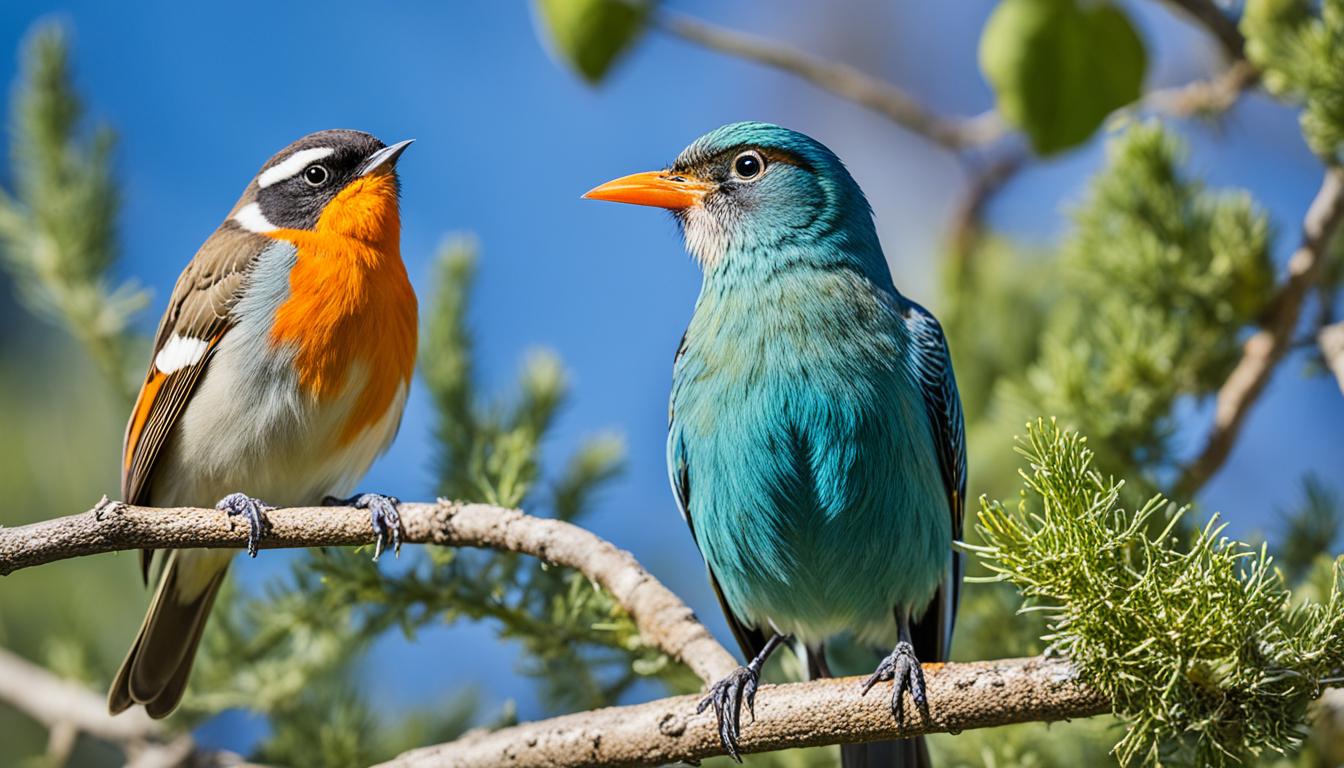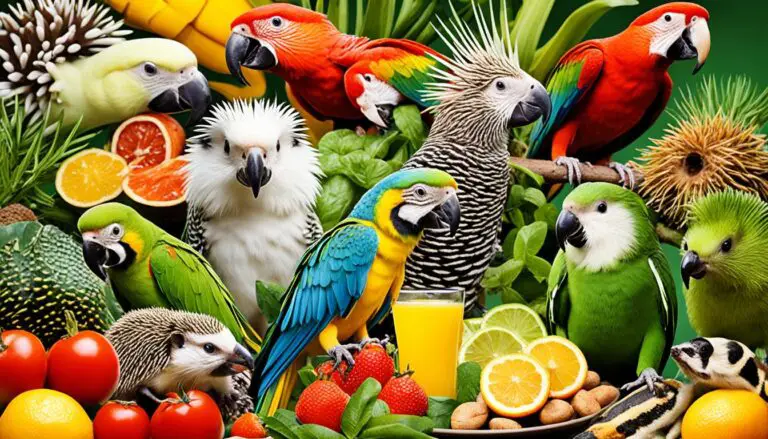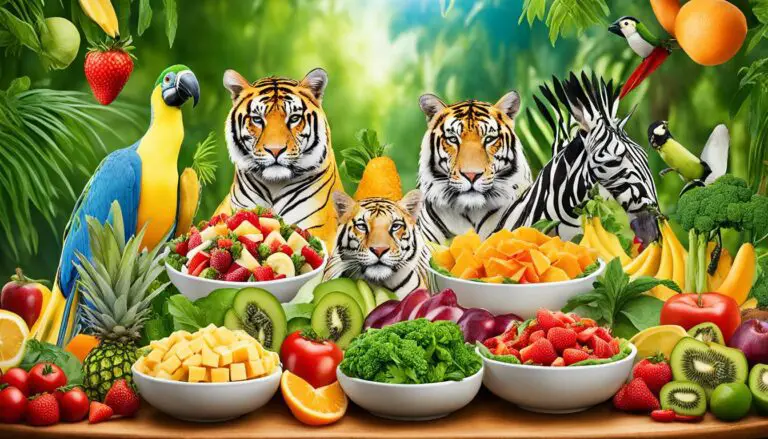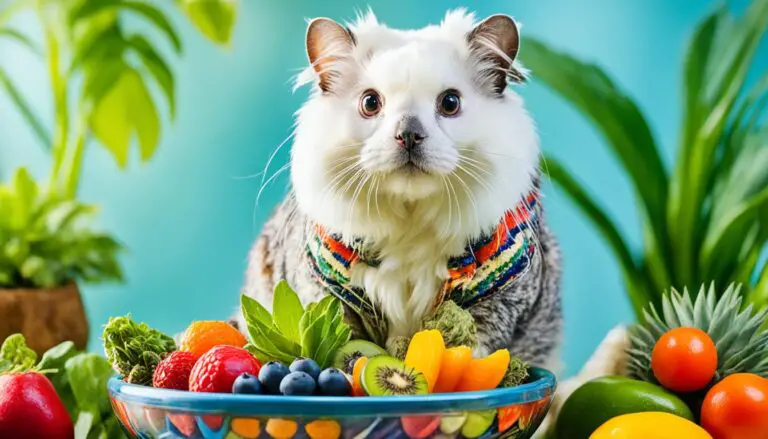Vitamin A in Reptiles & Birds: Balance & Dangers
Did you know vitamin A play a big role in reptiles and birds’ health? It’s key in keeping their eyesight sharp, tissues healthy, and immune function strong. But, too little or too much vitamin A can harm them.
Reptiles may get too much vitamin A from injections or if they eat too many vitamin A rich foods. Birds, on the other hand, can face a shortage or an overdose. Finding the right vitamin A balance is vital for their health.
Key Takeaways:
- Vitamin A imbalance can affect reptiles and birds, leading to serious health issues.
- Vitamin A plays a crucial role in maintaining normal epithelial tissues, vision, growth, reproduction, and immune function.
- Both vitamin A deficiency and hypervitaminosis A can pose significant risks to the health of reptiles and birds.
- Understanding the balance and dangers associated with vitamin A is crucial for ensuring the well-being of these animals.
- Proper diet management and supplementation are essential to prevent vitamin A imbalances in reptiles and birds.
Causes and Symptoms of Hypervitaminosis A in Reptiles
In reptiles, hypervitaminosis A happens from getting too much vitamin A by shots or in their food. Though vitamin A is needed, too much can hurt their health.
Too much vitamin A makes a reptile’s skin dry and scaly. It might be rough and flaky. The skin might even fall off, showing the muscle and skin underneath.
A reptile with too much vitamin A might look sad, tired, and not want to eat. This can lead to them losing weight. They can become dehydrated, which makes things worse.
The dry, flaky skin is most serious near their front legs and neck. This area might get worse than the rest of the body.
In chameleons, too much vitamin A can cause a bone disease because it stops vitamin D from working. This shows how dangerous too much vitamin A can be.
Doctors check many things to find out if a reptile has hypervitaminosis A. They look at the reptile’s past, test their liver, and check their blood and skin.
To help a reptile with too much vitamin A, doctors focus on caring for their skin and preventing infections. They also try to reduce pain and help the wounds heal. It’s key to stop more vitamin A from building up.
To keep reptiles healthy, it’s important not to give them too much vitamin A. They need a balanced diet to stay well.
“Excessive doses of vitamin A can have detrimental effects on reptiles, leading to dry, scaly skin, skin ulceration, depression, anorexia, and weight loss.”
Clinical Signs of Hypervitaminosis A in Reptiles:
- Dry, scaly skin
- Skin ulceration and sloughing
- Depression
- Lethargy
- Anorexia
- Weight loss
- Dehydration
| Vitamin A Toxicity Symptoms in Reptiles | Diagnostic Tools | Treatment Approaches |
|---|---|---|
| Dry, scaly skin | History and clinical examination | Supportive care |
| Skin ulceration and sloughing | Liver biopsy | Prevention of secondary skin infections |
| Depression | Serum vitamin A levels | Pain relief |
| Lethargy | Skin biopsy | Wound healing promotion |
| Anorexia | ||
| Weight loss | ||
| Dehydration |
Treatment and Prognosis for Hypervitaminosis A in Reptiles
Supportive care is key when treating hypervitaminosis A in reptiles. The goal is to avoid skin infections and limit further harm. Treatment involves cutting back or stopping vitamin A to help the reptile recover.
For severe cases, reptiles need special care. They might get fluids, be soaked in antiseptic solutions, and need medicine for pain. This helps them heal and feel better.
Treating long-term issues from hypervitaminosis A requires ongoing care. Reptiles need their wounds dressed, dead tissue removed, and special products to heal.
The chance of recovery for reptiles with hypervitaminosis A depends on a few things. This includes how bad the skin damage is, the vitamin A dose, and the reptile’s health. Most of the time, reptiles do well unless the skin is severely hurt or dead.

Veterinarian Tips for Managing Hypervitaminosis A:
- Consult with a reptile veterinarian for a proper diagnosis and treatment plan.
- Follow the recommended guidelines for vitamin A supplementation and ensure it is appropriate for your reptile’s specific needs.
- Be observant for any signs of skin lesions, dryness, or flakiness, which may indicate an imbalance in vitamin A levels.
- Avoid over-supplementing vitamin A, especially in carnivorous reptiles who may be more prone to hypervitaminosis A.
- Ensure proper husbandry practices, including maintaining humidity levels and providing a suitable and varied diet that meets your reptile’s nutritional requirements.
- Regularly monitor your reptile’s overall health and seek veterinary care promptly if any concerning symptoms arise.
“By taking proactive steps to manage and treat hypervitaminosis A, reptile owners can help their pets recover and thrive.”
| Treatment Strategies | Prognosis Factors |
|---|---|
| Supportive care measures (fluid therapy, hydrotherapy, antiseptic solution soaks) | Extent of skin lesions |
| Systemic antimicrobials | Amount and form of vitamin A given |
| Pain medication | Clinical signs present |
| Long-term wound management | Prior health of the reptile |
| Chronicity of the disease | |
| Aggressiveness of treatment |
Vitamin A in Birds: Deficiency and Toxicity
Vitamin A is very important for birds to be healthy and thrive. Birds need the right amount of vitamin A for growth, making babies, and fighting off sickness. But, too little or too much vitamin A can cause problems in their health.
The Risks of Avian Vitamin A Deficiency
If birds don’t get enough vitamin A, they can get very sick. They might not grow well, lose weight, have trouble breathing, or find it hard to have babies. Their immune system could become weak, making them more likely to get sick.
To avoid vitamin A deficiency, birds need a diet rich in vitamin A. Include foods like dark leafy greens, and orange and yellow fruits and veggies. This will make sure they get the vitamin A they need.
The Dangers of Vitamin A Toxicity in Birds
But, too much vitamin A is also bad for birds. They could show signs like a deformed beak, weak wings, or trouble breathing. In very bad cases, too much vitamin A can kill them.
Preventing too much vitamin A is key. Don’t overdo vitamin A supplements. It’s important to know the right amount your bird needs. Adjusting their diet as needed will help keep them safe from vitamin A overdose.
Preventing Vitamin A Imbalances in Birds
To keep birds healthy, the right amount of vitamin A is crucial. A diet full of vitamin A can prevent both low and high levels. Mix leafy greens, orange and yellow foods, and bird-specific diets for a good balance.
Watching your bird’s health over time is important. A vet can help you make sure your bird’s getting the best nutrition. They’ll guide you on the right vitamin A supplements and diet choices.
Diagnosis and Treatment of Vitamin A Issues in Birds
Diagnosing vitamin A problems in birds needs looking at their diet and blood test results. Lack of vitamin A shows up as poor growth, weight loss, and trouble breathing. They might also have issues reproducing and get sick easily.
On the flip side, too much vitamin A can cause beak and wing problems. Birds might find it hard to breathe and suffer from weak immune systems.
To fix a vitamin A shortage, birds must eat a balanced diet.
This includes fruits, veggies, and foods rich in vitamin A. They might also need special care and medicine if they have too much vitamin A.
Feeding birds right is the best way to handle vitamin A issues. A mix of leafy greens, certain fruits and veggies, and bird-specific foods is key. This can keep them from getting too little or too much vitamin A.
Getting the diagnosis right and treating bird vitamin A issues is crucial for their health. A plan that includes the right diet and care can help them bounce back from low or high vitamin A levels.
Sample Table: Symptoms of Avian Vitamin A Deficiency and Hypervitaminosis A
| Avian Vitamin A Deficiency Symptoms | Symptoms of Hypervitaminosis A |
|---|---|
| Poor growth | Beak deformities |
| Weight loss | Drooping wings |
| Respiratory distress | Respiratory distress |
| Reproductive problems | Weakened immune system |
| Increased susceptibility to infections | – |
Note: This is just a sample table for illustrative purposes. There might be other signs not mentioned here.

Importance of Vitamin A in Reptiles and Birds
Vitamin A is key for the health of both reptiles and birds. It helps keep their skin, eyes, and immune systems working well. It is also important for the growth and reproduction of these animals.
For reptiles, vitamin A is key for their skin and eyes. Have you ever noticed how vibrant a bird’s colors are? That’s partly due to vitamin A. It makes sure their feathers look beautiful and help them fly.
Reptiles who eat plants usually get enough vitamin A. But those who eat meat might need extra help getting this vitamin. Birds also need enough vitamin A for their feathers, beak, and to stay healthy. A diet rich in vitamin A helps them look their best and stay strong.”
But, too much vitamin A can be bad for both. We must find a balance. This keeps them healthy without causing problems.”
Vitamin A and Skin Health in Reptiles
“In reptiles, vitamin A is essential for healthy skin. It helps them shed properly and avoid dry, flaky skin.”
Reptiles really need vitamin A for their skin. It helps them shed old layers and stay healthy. Think of it as their first line of defense. Healthy skin keeps out harmful elements and diseases. Getting enough vitamin A lets them shed skin well and stay smooth and healthy.
Vitamin A and Feather Health in Birds
“For birds, vitamin A is a must for good feathers and beaks. It strengthens their immune system too.”
Vitamin A is crucial for birds’ feather health. Feathers help them fly and protect against heat and cold. Healthy feathers mean a lot to a bird’s health. Vitamin A helps them grow feathers that are strong and beautiful.
Beak health is another benefit of vitamin A for birds. A strong beak helps them find food and eat well. It also boosts their ability to fight off illnesses. For birds, vitamin A is a real superhero nutrient.
Getting the right amount of vitamin A is crucial for reptiles and birds. Reptiles need a diet full of plants or special supplements. Birds should eat a mix of foods that includes lots of vitamin A. But be careful not to overdo it. Too much of a good thing like vitamin A can cause problems for these animals.
Sources of Vitamin A for Reptiles and Birds
Reptiles and birds need vitamin A for good health. They get it from different foods. Getting the right amount is vital to keep them healthy. Too little or too much can be harmful.
Reptile Vitamin A Sources
Herbivorous reptiles find vitamin A in plants. Kale, spinach, and yellow veggies like carrots are great. They are full of carotenoids that turn into vitamin A.
If a reptile eats meat, it might not get enough from plants. They may need a vitamin A supplement. This ensures they get what they need.
Bird Vitamin A Sources
Birds eat fruits and veggies for their vitamin A. Good sources are apricots, cantaloupes, and greens like Swiss chard. These keep birds healthy.
Special bird food is also full of the right nutrients. It gives them a balanced diet. This includes enough vitamin A for their health.
But, don’t give too much vitamin A. It can be bad for them. A balanced diet is the key to their health.
Vitamin A Sources at a Glance:
| Reptiles | Birds |
|---|---|
| Leafy greens (kale, spinach) | Fruits (apricots, cantaloupes) |
| Orange and yellow vegetables (carrots, squash) | Leafy greens (Swiss chard, kale) |
| Fruits (mangoes, papayas) | Commercially prepared diets |
| Supplements (preformed vitamin A) |

Getting enough vitamin A is key, but too much is bad for reptiles and birds. Balanced meals and careful supplement use are crucial to their health.
Carotenoids and Vitamin A in Reptile and Bird Diets
Carotenoids are natural pigments. They are the building blocks for vitamin A. You see these vibrant colors in fruits and veggies. In reptiles, carotenoids help keep their vitamin A levels just right.
Iguanas and tortoises get carotenoids from plants they eat. These pigments become vitamin A in the reptiles’ bodies. This way, plant-eating reptiles get enough vitamin A without more supplements.
But for meat-eating reptiles like snakes and lizards, carotenoids are harder to find. They might need extra vitamin A. That’s to make sure their vitamin A levels stay healthy.
Birds need carotenoids too. These nutrients are key for their health and look. Carotenoids help keep their feathers and beaks in good shape. They also boost immunity and other body functions.
We need the right carotenoid levels for reptiles and birds to use vitamin A well. This keeps their skin and feathers healthy. It all starts with a diet full of carotenoid-rich foods like greens, and orange or yellow fruits and veggies.
The bright colors of fruits and veggies tell us they have carotenoids. These are vital for reptiles and birds.
The Role of Carotenoids in Reptile and Bird Diets
Carotenoids are key for vitamin A in reptiles. Their bodies turn these pigments into vitamin A. This is crucial for their healthy skin, eyes, and immunity.
Birds need carotenoids for colorful feathers and strong beaks. Their diet must include carotenoid-rich foods. This ensures they get enough vitamin A for their health.
Carotenoid-Rich Foods for Reptiles and Birds
| Foods | Carotenoid Content |
|---|---|
| Leafy greens (spinach, kale, collard greens) | High |
| Orange and yellow fruits (mangoes, papayas, apricots) | High |
| Orange and yellow vegetables (carrots, bell peppers, sweet potatoes) | High |
| Squash | Medium |
| Egg yolks | Medium |
| Millet | Medium |
| Pumpkin | Medium |
| Paprika | Medium |
| Tomatoes | Low |
A mix of the foods in the table is great for reptiles and birds. It makes sure they get enough carotenoids. This supports their vitamin A levels for good health.
Pet owners can help by feeding their reptiles and birds these carotenoid-rich foods. This helps their pets stay healthy by keeping their vitamin A at the right level.
Dietary Management for Vitamin A in Reptiles and Birds
It’s important for reptiles and birds to have the right mix of foods. This helps them stay healthy and keep vitamin A levels in check. The diet needs to include foods rich in carotenoids and those with preformed vitamin A. Each species has its own dietary needs, which makes a tailored diet essential. With the right diet, we can stop reptiles from lacking vitamin A and birds from getting too much.
Reptiles: Meeting Vitamin A Needs
For herbivorous reptiles, vitamin A comes from a plant-based diet. Things like leafy greens, orange, and yellow veggies, and fruits are full of carotenoids. These are turned into vitamin A. But, carnivorous reptiles might need help. Creatures like snakes and lizards may not make enough beta-carotene from their food. Too much vitamin A is bad, so it’s important to balance their diet carefully.
Birds: Preventing Hypervitaminosis A
Birds need just the right amount of vitamin A to avoid getting too much. They can get vitamin A from fruits, veggies, and specially made bird diets. A varied diet with lots of leafy greens and colorful fruits and vegetables is ideal. This keeps their vitamin A at the perfect level, steering clear of hypervitaminosis A.
| Reptiles | Birds |
|---|---|
| Offer a mix of carotenoid-rich plant-based foods | Provide a balanced diet with vitamin A-rich fruits and vegetables |
| Supplement carnivorous reptiles with preformed vitamin A | Avoid excessive vitamin A supplementation |
| Ensure proper nutrient balance | Consider the bioavailability of vitamin A |
Focus on a Balanced Diet
Offering a mix of the right foods is crucial for reptiles and birds. Reptiles need plenty of carotenoid-rich plants, whereas birds benefit from various fruits and veggies. It’s about understanding what each species requires. Keeping an eye on their vitamin A intake helps avoid any health issues.

Bioavailability of Vitamin A in Reptile and Bird Diets
The availability of vitamin A in reptiles’ and birds’ diets changes based on the vitamin’s source and diet balance. It’s vital to understand this to avoid vitamin A issues in these animals.
To make the best diet for reptiles and birds, choose vitamin A sources the body can use well. Not every form of vitamin A works the same way for these animals.
For reptiles, what they eat affects how well they get vitamin A. Plant-eating reptiles get vitamin A from carotenoids in greens, oranges, and yellows. But meat-eating reptiles might need extra vitamin A since they eat fewer carotenoid-rich foods.
For birds, their diet also plays a big part in getting enough vitamin A. Adding fruits, veggies, and special bird foods keeps their vitamin A at good levels. Yet, giving them too much vitamin A can be toxic.
Getting the right mix of all nutrients helps vitamin A work better in reptiles and birds. If other nutrients like calcium or vitamin D are off, they may not use the vitamin A well. This could cause vitamin A problems.
Diet choices and smart supplement use are crucial for how well reptiles and birds take in vitamin A. A diet rich in varied foods that supply enough vitamin A is key. This helps avoid both lack of vitamin A and too much, which can be harmful to birds.
Natural Sources of Vitamin A for Reptiles and Birds
Reptiles and birds get their vitamin A from natural sources. Herbivorous reptiles, like some turtles, eat foods filled with carotenoids. These include leafy greens, orange veggies, and fruits. This diet gives them enough vitamin A and keeps them healthy.
But, carnivorous reptiles, such as many lizards, need help. They can get extra vitamin A from special supplements. These supplements are made just for reptiles and make sure they’re not lacking any nutrients.
Birds find vitamin A in many fruits and veggies. Eating these not only gives them vitamin A but also other nutrients for their health. There are also special bird foods that have the right amount of vitamin A. These foods are made just for birds and keep them from getting sick because of vitamin A.
The Role of Natural Sources in Vitamin A Intake
The natural foods listed above are key for reptile and bird health. By adding these foods to their meals, pet owners make sure they get all the vitamins they need. This also makes them feel like they’re eating in the wild.
It’s important to feed reptiles and birds a mix of vitamin A-rich items. This mix should be both fresh and in their prepared foods. It stops them from getting sick because of a lack of vitamin A.
Getting the right amount of vitamin A is crucial. Too much vitamin A can be toxic. This is why owners should talk to a vet. They’ll help figure out the best way to add vitamin A to their pets’ diet safely.
By adding natural vitamin A sources, reptiles and birds stay healthy. They get the nutrition they need while living as they would in the wild. This helps prevent health issues linked to vitamin A problems.
Natural Sources of Vitamin A for Reptiles and Birds
| Reptiles | Birds |
|---|---|
| Leafy greens | Fruits |
| Orange vegetables | Vegetables |
| Yellow vegetables | Commercially prepared diets |
| Fruits |
Note: This table helps you see where reptiles and birds can get vitamin A. Always ask a vet or bird expert what specific foods your pet needs. They’ll know best for your pet’s health.
Conclusion
Adding vitamin A is vital for the well-being of reptiles and birds. It helps their skins and feathers stay healthy and supports growth. It also helps with making sure they can reproduce and boosts their immune systems. But, it’s important not to give them too much, which can be harmful.
For the right vitamin A, reptiles and birds need a balanced diet. Plant-eating reptiles usually get enough from their food. But, those that eat meat might need extra vitamin A. Birds benefit from fruits, veggies, and special diets made just for them.
It’s crucial to not overdo vitamin A supplements. Keep an eye on their levels and adjust the diet when needed. This way, your pets can be healthy without the risks of too much or too little vitamin A.
FAQ
What is hypervitaminosis A and how does it affect reptiles and birds?
What are the causes and symptoms of hypervitaminosis A in reptiles?
How is hypervitaminosis A in reptiles diagnosed and treated?
What are the risks and symptoms of vitamin A deficiency and toxicity in birds?
How are vitamin A issues in birds diagnosed and treated?
Why is vitamin A important for reptiles and birds?
What are the sources of vitamin A for reptiles and birds?
What is the role of carotenoids in reptile and bird diets?
How should the diet be managed to ensure appropriate vitamin A levels in reptiles and birds?
What is the bioavailability of vitamin A in reptile and bird diets?
What are the natural sources of vitamin A for reptiles and birds?
Why is it important to maintain a balance of vitamin A in reptiles and birds?
Source Links
- https://www.merckvetmanual.com/exotic-and-laboratory-animals/pet-birds/nutritional-diseases-of-pet-birds
- https://todaysveterinarypractice.com/exotic-medicine/hypervitaminosis-a-in-reptiles/
- https://www.ncbi.nlm.nih.gov/pmc/articles/PMC8157347/
Peter Stones is the founder of Exotic Pets Place, the leading online resource for exotic pet care information.
With over 10 years of hands-on exotic pet ownership experience, he is deeply passionate about sharing his expertise to help others properly care for their unusual pets.
When he's not writing extensively researched articles or connecting with fellow exotic pet enthusiasts worldwide, you can find Peter at home tending to his own beloved menagerie of exotic animals.







